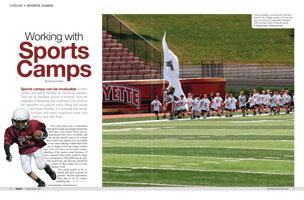
 |
| © James Boardman - Dreamstime.com |
Sports camps can be invaluable to event owners and sports facilities for numerous reasons. They are an excellent source of revenue, have the capability of attracting new customers, and enhance the reputation of a specific entity. Being that camps have these benefits, it is essential that facility directors and event organizers know how best to work with them.
First, there has to be a realization that sports camps are a unique business with their own issues. There are requirements they have to fulfill, and the facility director has to be certain these criteria are upheld. It is incredible to me when talking to individuals who are in charge of having camps on their sites, how few have an accurate understanding of the sports camp business. If this is ignored, then there could be negative consequences. The following are specific points the site director should be certain of that camps are in compliance with.
The camp needs to be licensed and have a permit to operate.Before agreement, there has to be an understanding that the camp will take care of all licensing issues. States are in charge of licensing, and frequently the Department of Health is the division responsible for camps.
There are countless camps not licensed, and many site directors do not have any idea this should be mandatory. Sometimes the camps themselves are unaware of this responsibility, surprisingly enough. If the prospective camps are reluctant to fulfill this obligation, then the site director should question how credible the particular entity is.
Camps should also be encouraged to be a member of a reputable camp organization. Two of the best known are the American Camp Association and the National Camp Association. By being accredited with either of these two groups, you will know that the camps you are associated with care about their industry standing. Another positive sign to look for in trustworthy camps is if they are involved with community and civic minded organizations.
The venue should also have a contract with the camp. There are numerous features which the agreement must include, and some of the essential criteria are dates and hours of camp, facility space to be used, insurance requirements, fees involved, and safety issues.
Regarding dates and hours, all of these times should be spelled out clearly in the contract. There cannot be any misunderstanding when and where the premises are used.
Concerning facility space, it also has to be stated that only specified areas of the complex are to be used. This may be a concern because at many locations there are multiple camps going on simultaneously, therefore separation is essential.
 |
| Young athletes running onto the field behind the college mascot for the last day of events at Lafayette College's 20th Annual Youth Football camp. © Cynthia Farmer - Dreamstime.com |
Camps should be required to secure liability insurance. Usually having a minimum amount of one million dollars coverage would suffice. The proper insured designations need to be correctly written in the contract.
There are companies specializing in camp insurance, therefore finding a good policy is relatively simple. A facility's insurance usually does not cover camps, so they need to acquire their own. Even when a facility is running their own camps, separate liability insurance specific to camps needs to be obtained.
When setting the camp fees, usually it is accomplished in one of two ways. First is by a flat fee rate, while the second is a sharing of revenues.
An example of a flat fee arrangement is when a camp is going to be at the venue for eight weeks, and the total remuneration can be paid all at once or in installments. I have found this type of settlement usually works best because everything is straightforward and upfront.
When I was running my camps at a college facility, it was always simple to pay the school one fixed amount, and not have to think about it further. The college was pleased with the arrangement and so was I.
With any type of split agreement, the camp and facility often work together on a fee sharing provision. Sometimes camps will pay facilities a definite amount up front, and then another fee after a certain level of campers has enrolled. Other times the two parties will share equitably in revenues according to a percentage formula.
Whichever payment agreement has been decided on, time limits on delivery should also be included. A facility or event director never wants to be in a position where funds have not been received with the camp season about to start.
 |
| St. Louis Rams' Dan Looker involved in parks and recreation youth football camp for kids grades 1 to 8. © Molly Williams - Dreamstime.com |
There is nothing more important when working with camps than to ensure safety issues are complied with. In the contract it should be written that the camp has to abide by all safety guidelines of the facility. If there is a pool, security concerns are especially heightened. Anytime there is swimming involved, strict measures need to be enforced minimizing any risk.
Chris Hagman, president of Atlantic Recreation Inc., which manages and consults with sports facilities, believes safety is an essential consideration when there are camps involved. He states, "As a director, safety should be a primary concern for all programs. Also, I am more sensitive to safety as participation increases. You need an acceptable ratio of staff to students, and the staff has to be trained on secure working environments."
The site director should select someone from his or her staff to monitor the camps, and ensure they are in compliance with the contract guidelines. The purpose of having a "point person" is to simplify matters, and make certain the complex is at all times being represented in an appropriate manner.
When working together, it would be wise if the directors of camps and site facilities look for additional revenue streams in the interest of both. An example of this is when a site director sees that there are periods of slow times during weekends or various parts of the year. Why not offer the camps to run weekend adult events, or evening programs. By presenting these options, there can be potential extra income for both groups, and good will is generated.
The venue manager can even offer camps the choice of if they want to run clinics or workshops at the facility. These events not only promote the camps, but they will be bringing in potential customers for other facility programs. Perhaps even discounts on venue activities can be offered at these locations. There are additional areas of mutual benefit between the two factions, and the site director and camp just need to be creative for this to work.
College athletic premises are an example of there being opportunities for numerous varied events to be run. The school administrators need to be certain that all NCAA guidelines are followed regarding dates, personnel and type of program.
More than anything else, a positive relationship needs to be developed between both parties. The site director or event manager will gain by having a solid revenue producing entity at its location, which can hopefully bring in additional customers. When the camps also bring with them excellent credibility, the reputation of the facility is enhanced.
For camps, there is the security of knowing they can be housed in a good location, with administrators who run a professional organization. Being that appropriate locales are difficult to find, camp owners can have the peace of mind to know there is a good possibility they will be in one place for many years.
Therefore, as the above reasons stipulate,it would be incumbent for individuals who work with camps at their locations, to better understand what this unique business is all about. By doing this, increased revenues and enhanced credibility for your facility can often be the end result. While camps too often mistakenly are not appreciated enough for the value they bring, the wise facility director or event organizer will reap the rewards of long term positive relationships.

